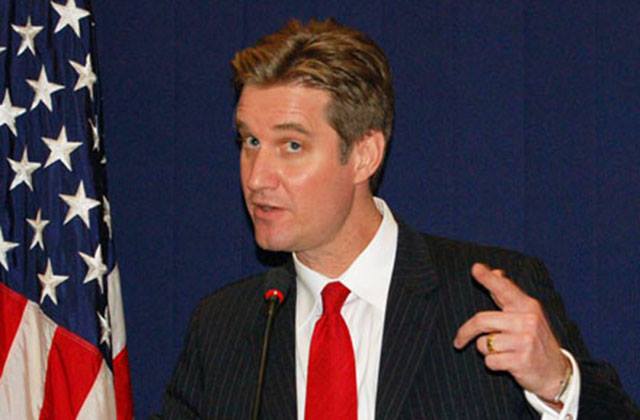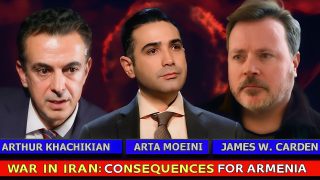The co-chairs should find a document to bridge Madrid and Kazan documents: Matthew Bryza

Interview with Matthew Bryza, former US Ambassador to Azerbaijan, Former U.S. Assistant Secretary of State for the South Caucasus, former OSCE MG U.S. Co-chair, Director of the International Center for Defence studies in Tallinn, Estonia.
As a result of the U.S. presidential elections on November 8 not only the president, but also the ruling party has changed, which supposes certain changes of approaches in some fields. What do you think what will be the Trump administration policy towards the South Caucasus, and particularly, in Russia, because we observe euphoria in Russia about Trump’s triumph?
Well, first of I heard no statements about the South Caucasus from Donald Trump. I would be surprised if you bring any example. He is a man with not only no foreign policy experience but no political experience at all. I’m confident that he’s never thought about the South Caucasus and I would be surprised if he heard of the conflict in the South Caucasus. He hasn’t said anything clear about the foreign policy other than in relationship with Russia. He doesn’t know anything about the foreign policy, he hasn’t said anything.
The only clear point that he said is the one in relationship with Russia and it may be differently reflected in the South Caucasus, e.g. one way is may be that the U.S. will adopt softer policy with Georgia’s independence. It could be somewhat overtime that Mr. Trump will understand a little bit about the South Caucasus to work with Russia on NK. In my experience of cooperation between the U.S. and Russia on Karabakh was quite good, even when it was terrible on Georgia. So the simple answer is it’s a little bit early to make anticipations.
Is it correct to divide American politicians to Republicans and Democrats when we talk about the U.S. foreign policy in general, and the South Caucasus direction in particular?
There is no difference between U.S. major political parties on the South Caucasus, zero, and similar difference on foreign policy, again between the parties. These are some nuances. But it’s the individual presidents, who make the difference. They set the tone in a very general framework, naturally, within the strategic interests of the U.S. Individual president can cause a dramatic change e.g. you remember in 2000 George W. Bush won Al Gore with difficulty. Al Gore gained more votes by the society, but president Bush won in the elections because of our electoral system.
Imagine if Al Gore won, probably, there would have never been a war in Iraq. That’s quite different, right? And similarly Barak Obama decided in the beginning of administration to make a huger error with review of policy towards Russia and, in response, president Putin took advantage and marched the biggest peace military buildup in history in the Baltic region. So there is no really difference between the parties’ positions, but it would be individuals and now we have to see what future president Trump is going to be.
OSCE MG U.S. co-chair James Warlick will step down on December 31. As we understand, the U.S. new presidency will start with a new co-chair in the MG. Should new approaches be anticipated from the new co-chair or the U.S. will remain unchanged in NK conflict?
I think there will be no change in the U.S. position on NK conflict and it shouldn’t be. Position of the U.S. would be the one to help the parties just in lasting settlement, beginning with framework agreement, which are also called basic principles. Of course, they won’t change. The U.S. isn’t going in favor of one side or the other, it will try to work both with Russia and France as much as possible.
The individual co-chair is definitely important, but it can’t change the strategic direction of American policy. This is the president, who can make some big decision, the co-chair can’t. The co-chair will simply be a more or less effective thinker.
What about current negotiations? These days special representative and spokesman of Russian FM M.Zakharova clearly stated that Azerbaijan refused to accept monitoring mechanisms on the line of contact, which have been covered in Vienna and St. Petersburg. How can the co-chairs and Armenia cope with the situation, when Azerbaijani president states that it’ll return Azerbaijani lands as it did with Lele Tepe?
I think it’s important for the parties to remain focused on basic principles, the Madrid principles, which both sides agreed in January 2009. I don’t want to go deep into the details, but the approach is one that we can accept and that needs to be finalized. All the other issues are secondary. I have to say that president Putin made a constructive proposal in St. Petersburg and you recall the major policies: let’s find a way to breakthrough, and make the Madrid Principles a little bit similar.
Instead of saying all 7 territories must be returned to Azerbaijan in exchange of other things, president Putin proposed that 2 territories were returned to Azerbaijan and the latter will restore communications with Armenia. That seemed to be accepted by both sides. I know for sure that in Baku there was a support for that. I mean what happened with police hostage crisis in Yerevan and most observers think that one of the major conflicts was that. Some people in Armenia don’t like the idea of any compromise.
I hope eventually that president Donald Trump will support and will speak with the president Putin and would try to move forward the process. But again we should see what the role of the U.S is.
Mr. Bryza do you think that the Armenian side refused to accept Putin’s plan?
I believe the Armenian Government’s very senior people are willing to consider and, maybe, accept it. But it should be considered the least. And we saw that some other people not in Government decided to organize that hostage crisis and therefore blocked any progress. You know better than I did, when the protests happened outside the police station, they were protesting against those proposals. That’s a difficult situation. Putin did something constructive and not the Government of Armenia but people outside of it are willing to use force to block any progress.
Recently Armenian president Serzh Sargsyan gave an interview to Dmitry Kiselyov saying that Armenia was ready to sign Kazan document, which supposed return of a few territories to Azerbaijan as well. However, Azerbaijan totally refused installation of crucial mechanisms on the way to make the progress in negotiations possible. How do you observe the way out?
I think compromise must be found between the so-called Kazan document and the Madrid document. Yerevan now says that it likes the Kazan document and Baku says it likes the Madrid document. In the beginning Baku didn’t so much like the Madrid document. So, I think the co-chairs with their top leaders—presidents, would be wise if they would do what president Putin suggests in St. Petersburg, which is: find a way to soften the differences between those two approaches.
Basically what the main differences are between the two main documents is Madrid talks about the return of several territories and Kazan document talks about only five of them. So, fundamental issues can be resolved. I think that can be an agreement, but it’s also pointless to speculate about the specifics of an agreement until the presidents of both countries have more time together and restore the trust that I said was beginning to exist in 2009. Until that happened, nobody is going to make a real concession or compromise, therefore all the public statements will just be political effects, the presidents should together sit and talk with the co-chairs.
Serzh Sargsyan seems to hint in his interview that there is a package prepared by the co-chairs, however, Azerbaijani position complicates its interpretation.
I don’t know, I’m not a co-chair. I don’t know what the co-chairs confidentially are doing and whether there isa document that tries to bridge the differences between the Madrid and Kazan documents.
In this situation, on account of escalation in the line of contact, is there a possibility for resumption of large-scale military operations? We observed rather active negotiations after the April war, and currently—crisis in negotiations, issues and tense line of contact. What should be anticipated?
I don’t have access to internal information and I don’t know what the disposition of military forces may be. What I do know is throughout my time with response to responsibilities for these issues I was worrying about individual soldiers on the line, who are killed by snipers, that’s horrible. But I wasn’t worried about the possibility of large-scale military operations, as there was no heavy military equipment on the line of contact. But that has changed now.
And so there is a greater threat that the conflict could evolve I mean the small conflict could become a large-scale one. But still I don’t think that will happen by an accident. I will disagree with the worries of the civil society organizations. I worry that one side will feel provoked and design a military action. I don’t think that it’s likely to happen in a short term. I don’t think Russia wants that to happen and be full scale violence, of course, the U.S., France as well, and I don’t think Azerbaijan wants that right now. Both countries—Armenia and Azerbaijan, have their own economic and political challenges and I think it’s unlikely that either party will decide to launch a large-scale military offenses, even though the situation is more dangerous, than in my time. The situation can’t change, as for now I think it’s relatively stable.
By Araks Martirosyan

























